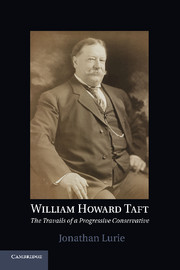5 - President Taft
Tensions and Travail, 1909–1910
Published online by Cambridge University Press: 05 December 2011
Summary
Tensions so Soon
The first indication that all was not well between TR and his successor came even before Taft’s inauguration. Perhaps unconsciously, Roosevelt at first may have assumed that nothing was different between him and Taft. But in fact, as Roosevelt ultimately recognized, their relationship had indeed irrevocably changed. The loyal and responsive subordinate was now the president-elect, while TR – buffeted by an increasingly fractious legislature – faced the inevitable waning of his power as March 4 1909, drew nigh. Initially, Taft had indicated that he intended to adopt Roosevelt’s cabinet as his own. “I did not see,” he stated to his aide Archie Butt, “how I could do anything else but retain all the old members of the Cabinet who had been associated with me.” How much influence Helen Taft exercised over her husband’s cabinet choices remains a matter of conjecture. However, she is on record as having stated in one instance, “I could not believe you to be serious when you mentioned that man’s name. He is perfectly awful and his family are even worse. I won’t even talk about it.”
Fleeing to Hot Springs, Virginia for some rest after his election, Taft apparently reconsidered. By late December, he had selected former Attorney General (and future Pennsylvania Senator) Philander Knox as Secretary of State. As to other positions, he observed to Knox that “I am trying … to act as judicially as possible, and to free myself from considerations of friendly association as far as I can and remain a decent man with red blood in me.” The net result of these efforts was a cabinet with only two holdovers from Roosevelt’s administration. Yet Taft hesitated to inform those who would not be retained. Early in January, TR bluntly suggested that “now I think it would be well for you to write them all at once that you do not intend to reappoint them….I do not think they ought to be left in doubt” (Figure 6).
- Type
- Chapter
- Information
- William Howard TaftThe Travails of a Progressive Conservative, pp. 91 - 117Publisher: Cambridge University PressPrint publication year: 2011



